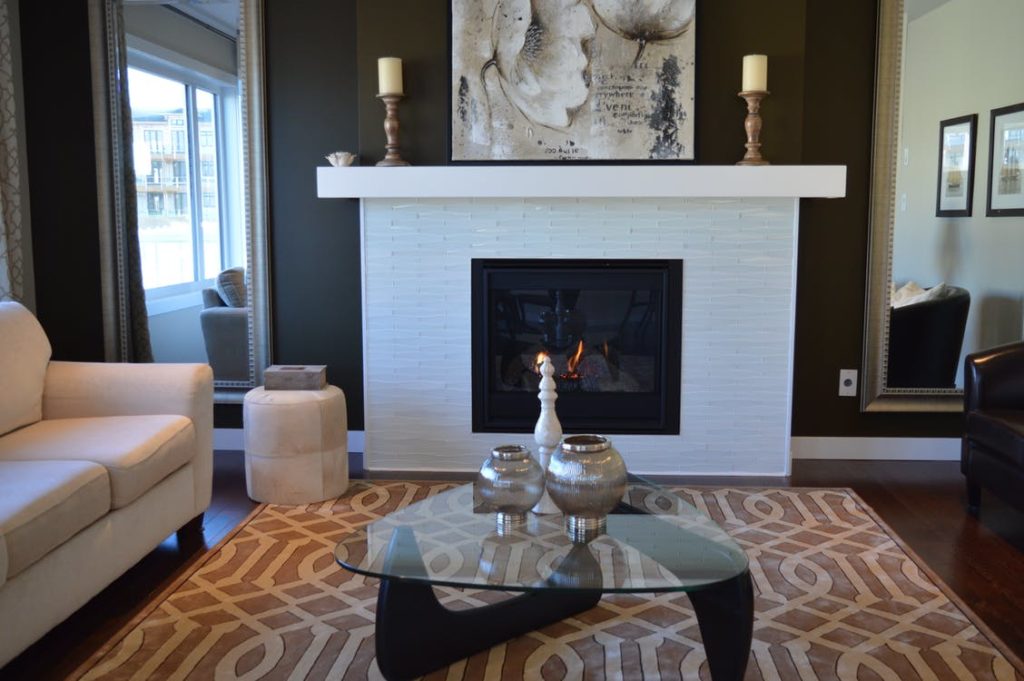Disclosure: This post may contain affiliate links, meaning we get a commission if you decide to make a purchase through our links, at no cost to you. Please read our disclosure for more info.
Discover the art of infusing your living spaces with the distinctive charm of bygone eras.
Whether you’re drawn to the grace of vintage furniture or the vibrant nostalgia of retro styles, this article will guide you through the key elements and practical tips to create your very own vintage paradise.
Dive in and get ready to transform your home into a space that beautifully balances the old with the new, adding character and warmth to every corner.
In This Post:
Understanding Vintage Design Styles
Vintage design styles often incorporate furniture from the ‘40s and ‘50s, offering a rich, layered look.
Opt for jewel tones, light colors, or even chalky shades. Mix antique pieces with modern ones to keep the balance.
The feminine silhouettes of vintage furniture are key, and colors like peach, pink, and pastels work well against all-white walls.
When it comes to decor, think old and new in harmony. Antique shelves and cabinets can enhance hallways and foyers, while clustered framed paintings create interest.
Gold-painted vintage decor adds class, and radial wall mirrors with golden accents can create the illusion of more space.
Crafting Vintage Living Room Spaces

Crafting vintage spaces speaks volumes about your personal style and taste. Here are four steps to get you started:
- Start by selecting vintage furniture. Look for pieces with character, such as a Chesterfield sofa or a mid-century coffee table.
- Play with colors. Opt for a muted, pastel palette or go bold with rich jewel tones.
- Incorporate antique accessories. Think of ornate mirrors, vintage lamps, or old-world artwork to add depth.
- Layer textures and fabrics. Use throw pillows or rugs featuring intricate patterns to imbue the room with warmth and elegance.
Vintage Kitchen and Bathroom Designs
Let’s explore the kitchen and bathroom, two spaces where vintage elegance can truly shine.
For your kitchen, consider retro appliances, farmhouse sinks, or patterned tiles, evoking a nostalgic charm. Use pastel colors or go bold with black and white checkered flooring.
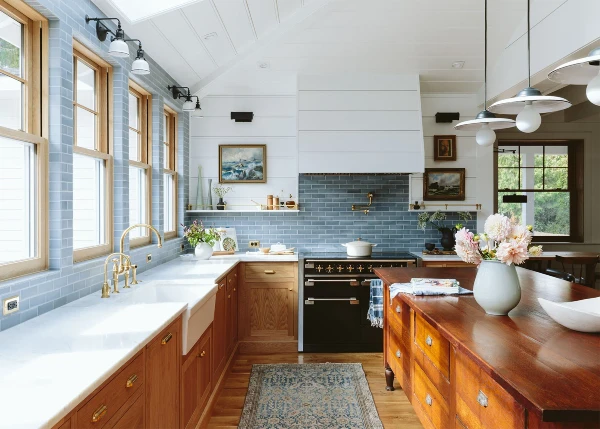
For cabinets, think about distressed wood or glass fronts. You can display pottery or ceramics. zakladyboleslawiec.com/poleng/ offers a great selection of authentic Polish pottery.
For the bathroom, consider a claw-foot tub or a pedestal sink for an instant vintage vibe. Choose subway tiles for walls and hexagonal tiles for floors. Incorporate brass or copper fixtures; don’t forget a large, ornate mirror.
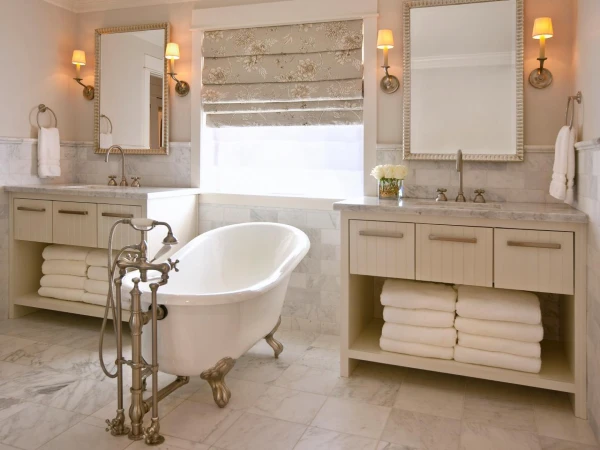
Maximizing Space With Vintage Decor
Incorporating vintage decor in your home isn’t just about style; it’s also an exercise in space utilization and room enhancement. When done well, vintage pieces can add character and create an illusion of spaciousness.
Here are four ways to maximize space with vintage decor:
- Use Mirrors: Vintage mirrors can make your room look bigger while adding a touch of elegance.
- Opt for Multi-functional Furniture: Antique trunks, for instance, can double as coffee tables and storage units.
- Incorporate Vertical Storage: Vintage shelves or cabinets can utilize wall space effectively, freeing up your floor space.
- Choose Light Colors: Light colors reflect light and make a room feel more spacious. Try incorporating vintage pieces in lighter shades for this effect.
Overview of Retro Interior Design
Retro interior design offers an equally nostalgic yet distinctive flair to your space.
Retro design draws inspiration from the mid-century modern and postmodern periods. Each era brings its unique furniture styles, patterns, and color schemes.
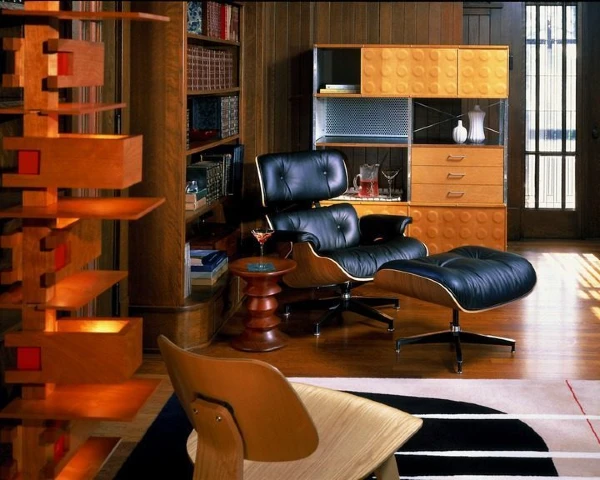
Mixing vintage décor with reproduction pieces creates a unique and inviting atmosphere. The beauty of retro design lies in its ability to evoke nostalgia while also allowing for personal creativity.
You can use bold patterns, iconic furniture, and distinctive lighting fixtures to establish a retro vibe. A balanced approach is key. Don’t overload your space with too many retro pieces.
Decade-Specific Retro Design Elements

Each era in retro design adds its distinctive elements and charm to your space.
Imagine the 50s with their pastel hues and iconic furniture, such as the Eames chair. The 70s scream bold prints and maximalist design, think hanging chairs and shaggy rugs. The 80s take a walk on the wild side with neon colors and acrylic furniture.
To help visualize, let’s list some key elements:
| Decade | Key Elements |
|
1950s Design
|
Pastel colors |
| Eames chair | |
| Atomic chandeliers | |
|
1960s Design
|
Groovy vibes |
| CH07 Shell Chair | |
| Plenty of houseplants | |
|
1970s Design
|
Bold prints |
| Hanging chairs | |
| Shaggy accents | |
|
1980s Design
|
Neon colors |
| Acrylic furniture | |
| Tropical prints |
Each decade adds a unique layer, creating a rich tapestry of design history.
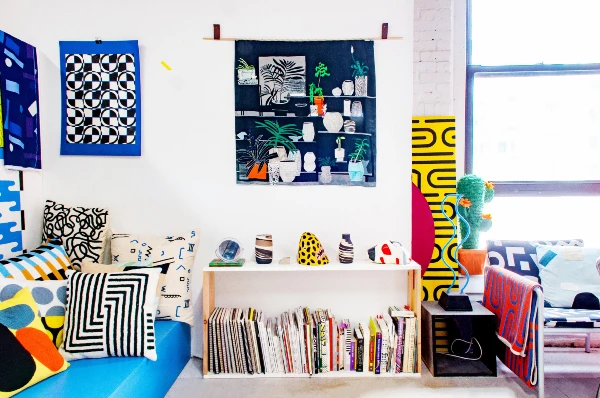
Common Pitfalls in Retro Interior Design
If you’re planning to opt for retro interior design, it’s crucial to be aware of common mistakes that could compromise your space’s functionality and aesthetic appeal.
One pitfall is overloading your space with too many retro elements. It’s easy to get carried away, but try to keep a balance.
Mixing too many different retro styles can also create confusion. Instead, opt for a more focused design.
Don’t sacrifice functionality for retro aesthetics. Remember, your home needs to be livable first and foremost.
Overlooking the importance of proper lighting is another common mistake. Good lighting is key to any successful design, especially for retro styles.
Lastly, always consider the overall balance and harmony. A well-designed space shouldn’t feel chaotic or cluttered.
Conclusion
From the elegance of regal furniture to the charm of pastel shades, you now have the tools to transform your space into a vintage paradise.
Keep in mind that it’s all about balancing the old with the new. Don’t be afraid to make it uniquely yours.
With these tips, you’re ready to create a breathtaking, nostalgic yet contemporary space.
Main Image Source: Shopify


